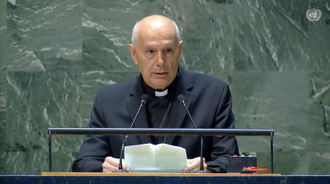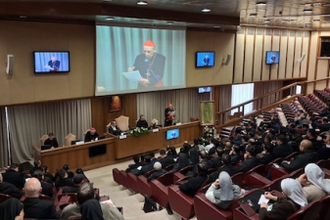Holy See statement at UN on International Day Against Nuclear Tests

Archbishop Caccia at UN
On 4 September 2024, Archbishop Gabriele Caccia, Permanent Observer of the Holy See to the United Nations, issued a statement at the General Assembly High-level Plenary Meeting to Commemorate and Promote the International Day Against Nuclear Tests (IDANT) in New York.
In his remarks, Archbishop Caccia reaffirmed that the 15th anniversary of IDANT is an opportunity for reinforced global commitment to the cessation of nuclear testing. He stressed that the Comprehensive Nuclear-Test-Ban Treaty (CTBT) must be enforced and that the International Monitoring System and all associated verification mechanisms should be fully implemented.
Quoting Pope Francis, the Permanent Observer underscored, "Now is the time to counter the logic of fear with the ethic of responsibility, and so foster a climate of trust and sincere dialogue."
The text of the statement follows.
Mr President,
Since the dawn of the nuclear era, marked by the first test on 16 July 1945, more than 2000 tests have been conducted, with significant impacts on land, in the oceans, underground and in the air. Displacement, contamination of food and water, disruption of people's spiritual connection to our common home, the Earth, and intergenerational health issues are among the immense disasters caused by these tests. Indigenous peoples, women, children and the unborn are disproportionately affected by the adverse effects of such testing.
The dire consequences of nuclear warfare, including the grave risks of nuclear fallout and catastrophic accidents, has become even more apparent with the advent of more destructive nuclear weapons.
In light of the increasing threat posed by the use of nuclear weapons and the concomitant rise in military expenditure, the 15th anniversary of the International Day against Nuclear Tests provides an opportunity to emphasize the necessity for a reinforced global commitment to the cessation of this dangerous practice.
Pope Francis asserts that "the ultimate goal of the total elimination of nuclear weapons becomes both a challenge and a moral and humanitarian imperative".[1]
Indeed, States have a moral obligation to rebuild the lives of those affected by nuclear testing while also protecting the environment for future generations. Only through a collaborative effort a world free from nuclear weapons can be forged. This requires international cooperation and commitment to disarmament treaties, as well as the provision of resources and support to affected communities.
In order to achieve this ambitious goal, it is essential that the Comprehensive Nuclear-Test-Ban Treaty (CTBT) is enforced and that the International Monitoring System and all associated verification mechanisms are fully implemented. Furthermore, strengthening the ban on nuclear-explosive testing, as outlined in the Treaty on the Prohibition of Nuclear Weapons (TPNW), is of paramount importance.
Mr President,
Allow me to conclude by quoting Pope Francis, "Nuclear deterrence and the threat of mutually assured destruction cannot be the basis for an ethics of fraternity and peaceful coexistence among peoples and states. The youth of today and tomorrow deserve far more. They deserve a peaceful world order based on the unity of the human family, grounded on respect, cooperation, solidarity and compassion. Now is the time to counter the logic of fear with the ethic of responsibility, and so foster a climate of trust and sincere dialogue".[2]
Thank you, Mr President.
[1] Pope Francis, Encyclical Letter Fratelli Tutti, 3 October 2020, 262.
[2] Pope Francis, Message on the Occasion of the Vienna Conference on the Humanitarian Impact of Nuclear Weapons, 7 December 2014.


















